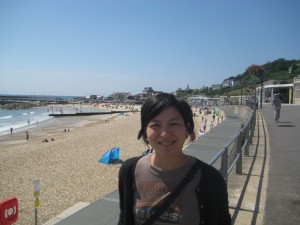 As a BICC postdoctoral researcher at the University of Bristol’s history department this past year, I have had the opportunity to work on a number of fascinating projects that have expanded my research horizons and encouraged me to rethink the way I approach source material in my own work. The first of these has been the Historical Photographs of China – also known as the Visualising China – project. It introduced me to a rich visual record of the Chinese past, full of serendipitous interconnected personal histories and forgotten vistas.
As a BICC postdoctoral researcher at the University of Bristol’s history department this past year, I have had the opportunity to work on a number of fascinating projects that have expanded my research horizons and encouraged me to rethink the way I approach source material in my own work. The first of these has been the Historical Photographs of China – also known as the Visualising China – project. It introduced me to a rich visual record of the Chinese past, full of serendipitous interconnected personal histories and forgotten vistas.
The second, which is tied to the ACRE (Atmospheric Circulation Reconstruction over the Earth) endeavor at the MET Office, gave me a glimpse of how the travel writings and records of nineteenth-century adventurers and merchants could be put to use to measure historical patterns of climate change. Both projects have given me a sense of how history could be put to use both directly and indirectly: from heritage and educational work to thinking about perhaps the biggest challenge of our time.
My own research explores China and Taiwan. Over the past few years, with the help of a postdoctoral fellowship on the Leverhulme-funded China’s War with Japan project that ran from 2009-2011, I’ve been looking at plans for rehabilitation and reconstruction in China during the war years. The first part of this research, which interrogates the transnational influence of reconstruction planning, recently appeared in the European Journal of East Asian Studies. This article analyses the influence of the Beveridge Report and the American Social Security Act on Chinese social policy planners, exploring what their interest in these designs can tell us about the contours of the Nationalist (Guomindang) state in an era of total war.
My interest in postwar planning developed from my Ph.D., which I undertook at Bristol under the supervision of Professor Robert Bickers. The thesis focused on the first decade of Guomindang rule on Taiwan from 1945-1955, considering how the problem of mobilising a disaffected (and terrorised) island population help shaped the way party leaders reformed what a decrepit party-state. Their state-building techniques, I argue, provide an insight into how party leaders and the rank-and-file conceived of how authority was earned and used. This work adds to the growing literature on the political culture of the early Cold War in East Asia. I will be giving a talk on this project next week, August 13, as part of Hoover Institute’s workshop series ‘Revisiting Modern China’.
The BICC postdoc this year afforded me some valuable time to advance my research and teaching as well as introduce me to realms of history and public engagement that I had not experienced before. It has proven a vital stepping stone in the development of career . As of September 2013, I will be taking up a permanent lectureship in Chinese History at Exeter University, but I am keen to keep up with the projects I’ve been involved with over the past few months.
